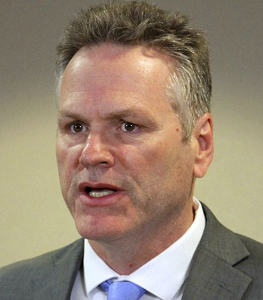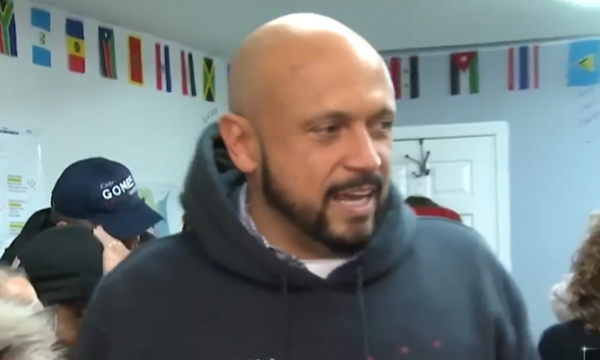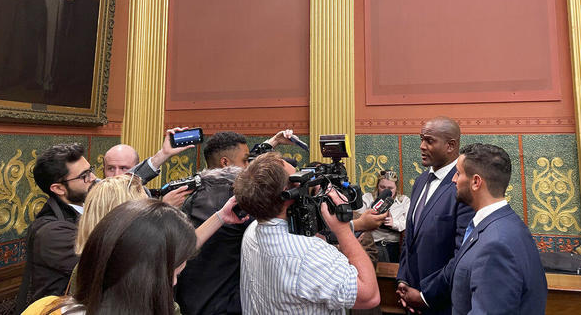Recall efforts roil western states
New developments over the past month have increased chances that voters could remove two West Coast governors: one Democrat and one Republican.

California Gov. Gavin Newsom
California’s recall election has been scheduled for Sept. 14. Until recently polls suggested that Gov. Gavin Newsom could comfortably stave off the recall effort, but his reputation took a big hit this month in the wake of a severe drought and a spate of major wildfires. Criticism of his handling of the COVID crisis, too, has ramped up with the spread of the more deadly Delta variant.
As a result, polls show a tightening race in which voters are almost evenly split on recall. The most recent suggests that only 50% of likely voters will choose to keep him in office, while 47% would vote to recall him.
Newsom himself appears worried. His campaign just unveiled a major ad campaign starring Sen. Elizabeth Warren of Massachusetts, who blames the recall effort on “Trump Republicans” who are “attacking election results” nationally and now “coming to grab power in California.”
Two major questions loom over the contest:
- Will Newsom’s supporters show up at the polls? The recall vote will occur as a special election, which are typically low-turnout affairs. Only 8% of Democrats expect the recall effort to succeed, meaning that many may not feel motivated to participate in the election. Republicans, meanwhile, are pumped up, with 90% saying they are “highly interested” in this election, as compared to 58% of Democrats and 53% of independents.
- If Newsom is recalled, who will select his successor? A second question on September’s ballot asks who should replace Newsom if the recall is successful. 46 candidates will appear on the ballot, but this list does not include a single elected Democratic officeholder. Many Democratic voters are likely to skip this question entirely, leaving the selection of California’s next governor primarily in the hands of the state’s Republican minority.
In short, the possibility of recall is very real, and no one has much of a clue as to who would serve out Newsom’s term if he is recalled.
One recent poll found that 53% of Californians are undecided on that question. For now, conservative radio host Larry Elder – who jumped into the race only a few weeks ago – leads the polls with 18%, with former San Diego mayor Kevin Faulconer and businessman John Cox barely creeping into the double digits. All three are Republicans. The highest-ranked Democrat in the race is a YouTube celebrity and political newcomer, Kevin Paffrath, who now polls at 3%.
Faulconer twice won election in a liberal Democratic city, and Democrats might vote for him as the Republican candidate whom they perceive to be most moderate. But Newsom’s own team, which contests Faulconer’s reputation as a moderate, has put considerable effort into discrediting him.
Among the few factors working in the governor’s favor: a $30M war chest and the failure so far of opponents to coalesce around a single alternative.

Alaska Gov. Mike Dunleavy
In Alaska, meanwhile, it’s a Republican governor, Mike Dunleavy, who’s facing recall. Dunleavy, who won office as a backer of former president Donald Trump, is a polarizing figure who has governed since 2019 with Trumpian bluster. A recall campaign, launched two years ago, accuses him of abusing his budget power to punish judges, misusing state funds for partisan purposes, failing to meet a critical legal deadline, and “incompetently” and mistakenly vetoing $18M more than his office revealed. That last error appeared likely to cost the state $40M in federal Medicaid funds.
The Alaska Supreme Court in May 2020 allowed the recall effort to proceed, and in its full decision, just released two weeks ago, it clarified that all four allegations were legitimate grounds for recall.
If the matter comes to a vote, however, Alaskans will likely base their decisions on their opinions of Dunleavy and his policies. For many, his biggest sin may have been canceling this year’s entire Alaska Permanent Fund dividend, a rebate paid annually from the state’s oil revenues. Many Alaskans regardless of political persuasion rely on this unique perk to meet their yearly financial obligations.
Backers meanwhile have not yet filed enough signatures to place the question on a statewide ballot, although by late April they claimed to be within 20% of reaching that goal.
If Dunleavy is recalled, Lt. Gov. Kevin Meyer, also a Republican, would assume his duties as governor.


